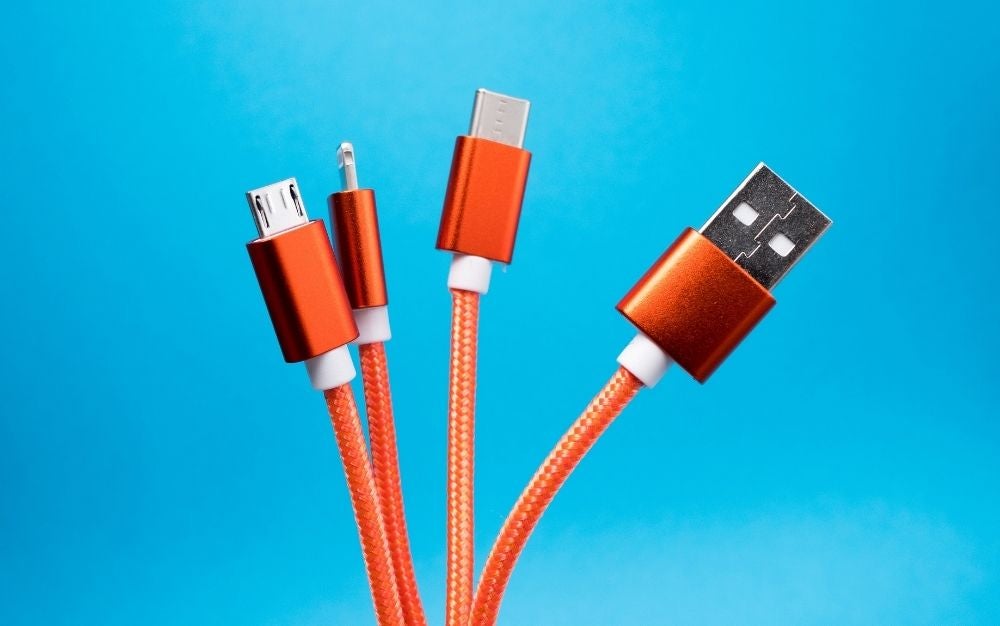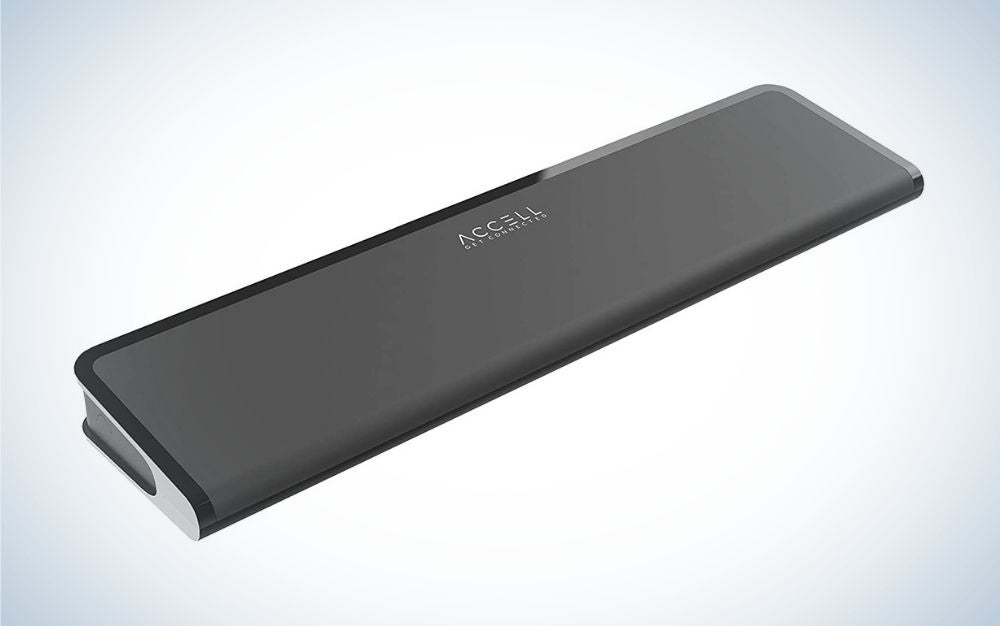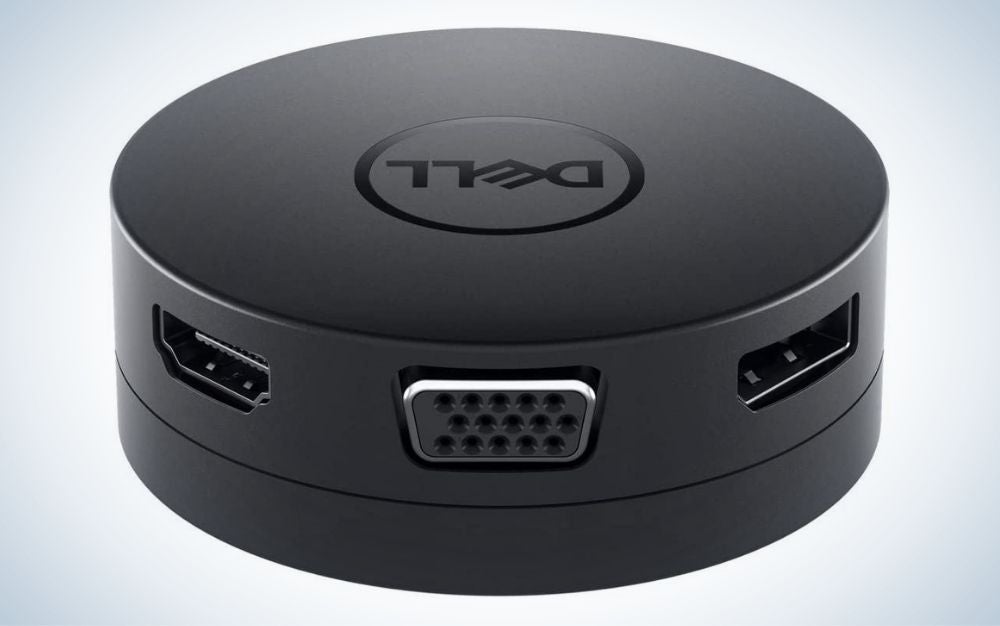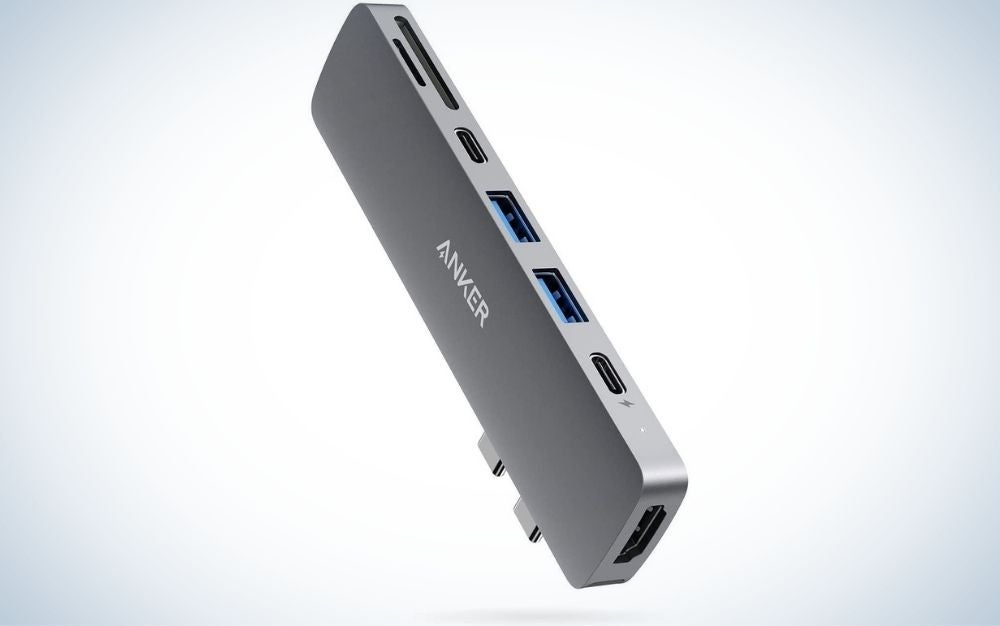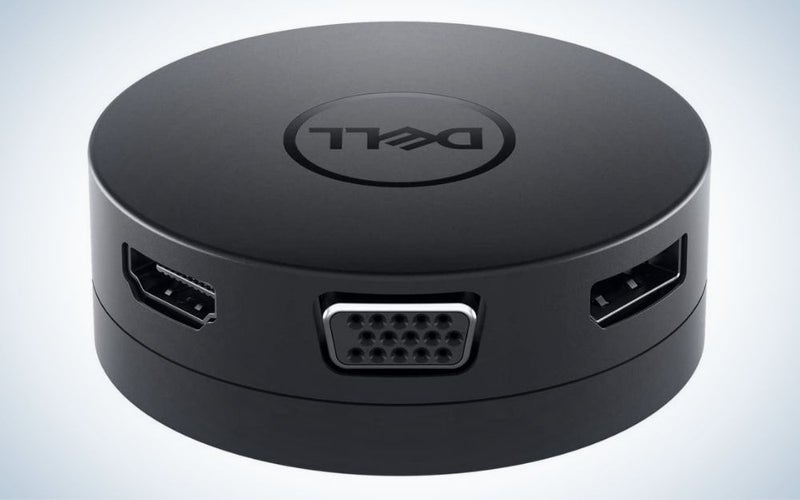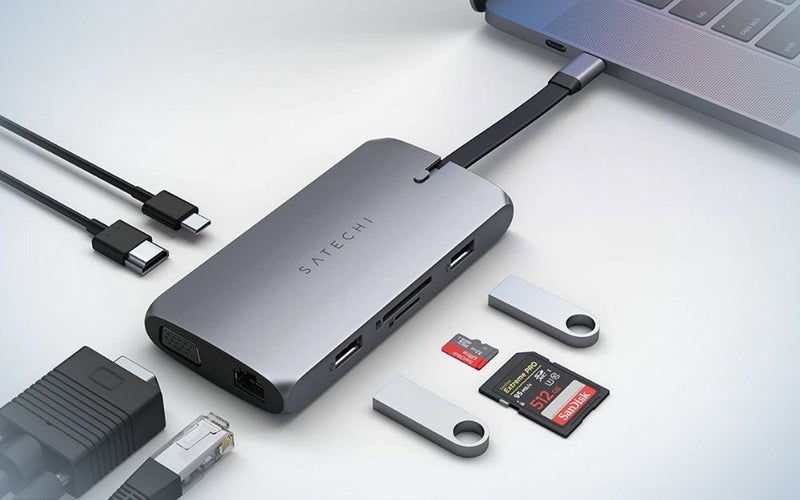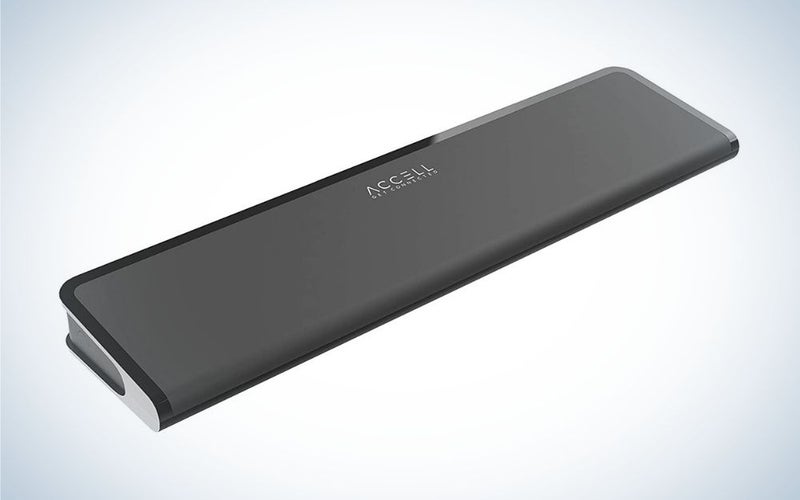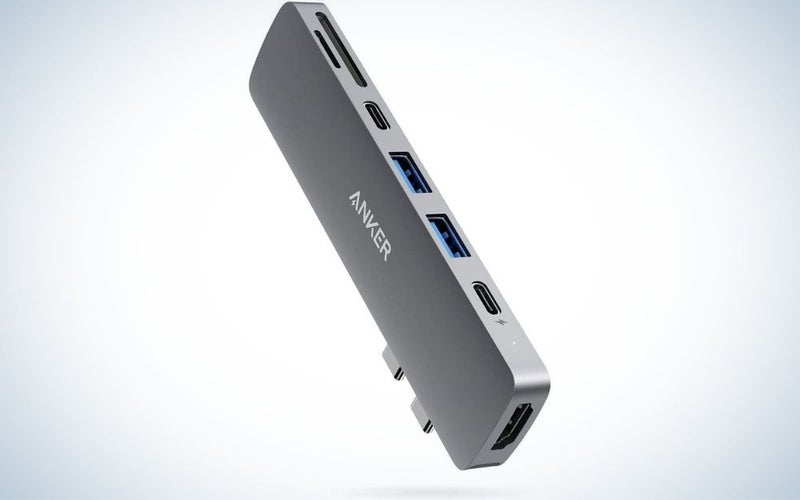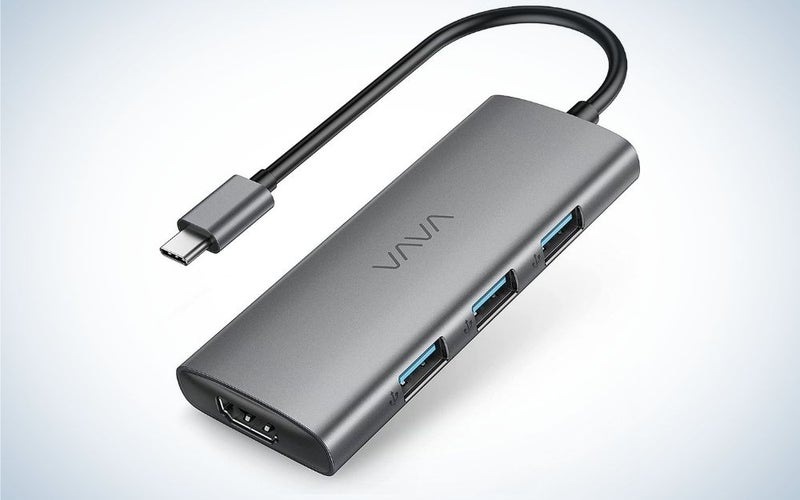We may earn revenue from the products available on this page and participate in affiliate programs. Learn more ›
Ports or portability? That’s long been the tradeoff considered by makers of modern laptops. To create ultralight devices that can easily travel anywhere, manufacturers have opted to eliminate ports like USB-A, HDMI, and Ethernet, which take up space and add pounds. While that’s well and good for users surfing the internet in a café or taking notes in class, most of us still need those “old-school” ports for some computer accessories—whether it’s to connect a projector for a presentation, charge our smartphone, or share files directly with another device. The best USB-C hubs problem-solve this paucity of ports by plugging into one of those now-ubiquitous oval-shaped ports built into modern laptops and expanding the data and devices it can manage.
- Best USB-C hub for travel: Dell USB-C Mobile Adapter
- Best USB-C hub for MacBook Pro: Satechi USB-C On-the-Go Multiport Adapter
- Best USB-C docking station: Accell Driverless USB-C 4K Docking Station
- Best wire-free USB-C hub: Anker USB-C Hub for MacBook
- Best budget USB-C hub: Vava USB-C Hub
What to consider when shopping for the best USB-C hub
From packability to compatibility, there’s a lot to consider when shopping for the best USB-C hub. Here’s what you need to know if you want to boost your buying power:
What is a USB-C hub?
As the name universal serial bus (USB) suggests, USB connections are designed to be used with a variety of devices. The USB-C, an upgrade to the once-standard rectangular USB-A port, has the upside of never being upside down. That means users can plug into the oval-shaped USB-C port and power up or transfer data without thinking twice about cord orientation. The USB-C port has been adopted by major manufacturers—including Apple, Dell, Microsoft, and Samsung—which is great for creating a standardized approach to power and connectivity and limiting the need for that tangle of cords in your kitchen drawer.
However, in the process of standardization, many companies have opted to rely solely on USB-C when building laptops, entirely eliminating other ports that many of us still rely upon. This necessitates USB-C hubs, which are adapters that transform your computer’s USB-C port into a variety of other inputs/outputs, ranging from Ethernet and USB-A ports to microSD slots and microphone jacks.
Will you primarily use your USB-C hub as a laptop docking station?
The pandemic has changed desk jobs forever, with computer work now happening at many locations. The coffee shop in the morning, the downtown office for a meeting, the home office on Wednesdays and Fridays. Laptop docking stations allow you to plug your machine into a desktop setting, combining the portability of a laptop with the functionality of a desktop—because when you’re in a virtual meeting or preparing a presentation, it’s helpful to use a dual-screen setup. Many laptop docking stations now provide that mirroring through a USB-C connection, making USB-C hubs a great option.
If you’re planning to use your USB-C hub as a docking station, the main consideration is the power supply. If your dock doesn’t properly charge your laptop, you could find yourself out of battery by lunchtime when you open your computer to access notes from the morning meeting. To make sure your dock can properly charge your laptop, compare the wattage of your laptop’s power supply to the wattage capable of being transferred through your USB-C adapter. If the laptop’s number is higher, the dock won’t do the job.
The other big consideration in docking is whether it can support a Thunderbolt 3 connection. Identical to the USB-C port in shape, the Thunderbolt 3 can offer four times the data transfer speed, meaning if you have a laptop with a Thunderbolt port but your dock doesn’t support it, you’ll be missing out.
Other factors in docking are also important, but they depend on the way you intend to use your USB-C hubs. We examine the various options below.
Do you need a transportable USB-C hub?
Some USB-C hubs can easily fit in your pocket. If your intent is to travel with your adapter so you can plug your laptop into a projector at the Denver office one week and the Ethernet at the Seattle office the next, look for a USB-C adapter that is small and light. You can easily find options that are no bigger than your phone and no heavier than a deck of cards. If the adapter will live at one office and serve mainly as a laptop dock, weight and size are less important.
Are you looking to mirror high-quality video and audio?
Via USB-C to HDMI, Thunderbolt, USB, or VGA connections, USB-C hubs are capable of transmitting video quality of up to 5K. Part of the video—and sound—quality is determined by how fast your USB-C adapter can transmit data. If your hub supports Thunderbolt 3, it could be capable of transferring data at up to 40Gbps, which is as fast as a standard Ethernet connection and twice as fast as the 20Gbps available from the fastest USB-C ports.
Will you use your hub to transfer power?
USB-C hubs allow you to pass power onto other devices, meaning you can recharge your phone or smartwatch while you’re working. Many USB-C ports can transfer 100 watts of power, leaving plenty in the tank even when using less than 10 watts per hour to charge a smartphone.
Do you need a USB-C to Ethernet connection?
Sometimes wireless internet just isn’t fast or secure enough. Some adapters feature USB-C to Ethernet connections so you can tap into wired gigabit Ethernet.
Will your USB-C hub work with your laptop?
The best USB-C hub for MacBook Pro might not work at all with a different laptop. Be sure that your hub is compatible with the device and operating system you want to link it to. Otherwise, trying to connect your Microsoft product to an iOS-only hub will be like trying to compare Apple to oranges.
What else do you need?
In addition to supplying extra USB ports, some USB-C hubs provide options like headphone jacks and microSD card slots. So if you want to use an old model of earbuds to listen to music on your laptop or upload photos from a digital camera, look for a USB-C adapter with such features. In short, you need a hub that will connect to all the computer accessories you want to use.
The best USB-C hubs
USB-C hubs are well-equipped adaptors that can transform a single port into an array of options, giving your portable laptop all the potential of your desktop. Go ahead and close your Google window, because we’ve already gone ahead and plugged into the right information so you can find the best USB-C hub for you.
Best USB-C hub for travel: Dell USB-C Mobile Adapter
Dell
Measuring in at about the size of a hockey puck and only slightly heavier than a C battery, this 7-in-1 Dell adapter is the best USB-C hub for those on the go. The elegant circular design has all ports on its side, creating a clean look that feels even tidier when you twist to reel in the USB-C cable. Connect the USB-C adapter to a projector or TV screen via the DisplayPort or HDMI 2.0 port and deliver your next boardroom presentation in up to 4K resolution at 30Hz. You can also share files at up to 10Gbps through the two USB-A or one USB-C downstream ports—or pass up to 90W to charge your phone, tablet, or another device. Compatible operating systems include Apple MacOS, Red Hat Enterprise Linux, Ubuntu, Google Chrome OS, and Windows 10 64-bit Edition.
Best USB-C hub for MacBook Pro: Satechi USB-C On-the-Go Multiport Adapter
Satechi
The On-the-Go Multiport is truly multifunctional. In one sleek and portable 4.4-ounce, 4.75-inch-long package—roughly the size of the first-generation iPod—you get 100W USB-C PD charging, an HDMI port up to 4K at 60Hz, a VGA port up to 1080P at 60Hz, two USB-A 3.0 ports, a USB-C data port, gigabit Ethernet connectivity, and microSD and SD card reader slots. This is the best USB-C hub for MacBook Pro and it’s compatible with models from 2016-2020, as well as several other Apple products, including iPad Pro 2019/2017 and MacBook Air 2020/2018. In addition, the hub works with the Microsoft Surface 3, Google PixelBook Go, ChromeBook, and the Samsung Galaxy Tab Pro S, among other devices. Unfortunately, there is no audio jack, and the USB-C port is not compatible with the Apple SuperDrive CD/DVD player.
Best USB-C docking station: Accell Driverless USB-C 4K Docking Station
Accell
Plug in your laptop to a USB-C docking station, and you can access your entire laptop from a connected desktop. The Accell Driverless USB-C docking station excels because it requires no installation or administrative privileges to mirror multiple displays at once. It’s also compatible with the vast majority of modern laptops, as well as Microsoft Windows, Mac, Android, and Chrome operating systems. It includes two 4K-capable HDMI ports, three USB-A ports, gigabit Ethernet, and audio jacks for headphones and microphones. At 1 pound, this adapter is on the heavy side and is probably best left at a desk where you’ll use it most. Still, it’ll easily fit in your briefcase or large purse if you need to bring it to the boardroom. Plus, this USB-C adapter is efficient, transferring data at up to 10Gbps and supplying connected devices with up to 240V of recharging power.
Best wire-free USB-C hub: Anker USB-C Hub for MacBook
Anker
If you can’t handle another cord in your life, look for a wire-free USB-C hub that plugs directly into your computer’s USB-C port. Specifically made for MacBook users, this Anker looks and feels like it’s built into your laptop, even matching the silver color. And adding just over an inch to the top-left side of your laptop adds a ton of capability. This wire-free USB-C hub turns your MacBook’s two USB-C ports into a Thunderbolt USB-C port, a USB-C data port, two USB-A ports, an HDMI port, an SD card slot, and a microSD card slot. Connect to multiple monitors at once and receive a resolution of up to 4K at 30Hz (HDMI) and up to 5K at 60Hz (Thunderbolt 3). The USB-C port will also transmit data at up to 40Gbps and transfer up to 100W to recharge connected devices.
Best budget USB-C hub: Vava USB-C Hub
VAVA
You don’t have to overextend your budget to find a high-quality USB-C adapter. This Vava hub comes with three USB 3.0 ports, one HDMI port, one PD charging port, one SD card slot, and one TF card slot. Through the HDMI port, it can transmit up to 4K video at 30Hz, or up to 1080p video at 60Hz. Additionally, it can share data at up to 5Gbps through the USB 3.0 ports or up to 480Mbps through the SD and TF slots. The hub also offers 100W of charging power, and it is versatile—supported by Windows, Mac, Unix, and Chromebook operating systems. With more than 6,000 Amazon reviews, this bargain USB-C port averages 4.7 out of 5 stars, making for a lot of satisfied customers.
FAQs
Q: How does a USB-C hub work?
A USB-C hub works by plugging into your laptop’s built-in USB-C port, thus turning a single jack into a variety of options—from additional USB ports to Ethernet to HDMI.
Q: Does a USB-C hub require power?
A USB-C hub does not require power to work, but if you’re hoping to use it to charge your laptop, you’ll need to connect it to an outlet or a plugged-in desktop computer. You might also notice limited passthrough power if the adapter is unplugged, meaning even charging a small device like a smartphone could feel like you’re living in the days of switchboard operators.
Q: Are USB hubs any good?
Yes, USB hubs can be good. Many smartphones, tablets, and other gadgets still connect to power outlets or other devices through USB ports, so having a bank of USB inputs can be useful.
The final word on shopping for the best USB-C hub
The best USB-C hub provides all the ports you need, while simultaneously allowing you to easily unplug when a laptop is all you require. Such an adapter can serve as a laptop docking station, USB-C to Ethernet connection, or even just as a bank of extra USB ports. As more laptops are made with only USB-C ports, USB-C adapters will increasingly become one of the most important computer accessories you can buy.
